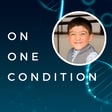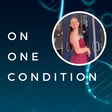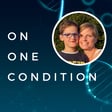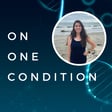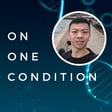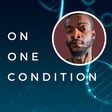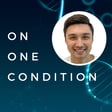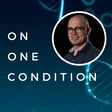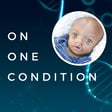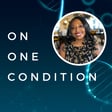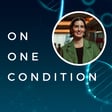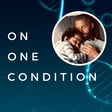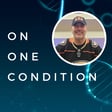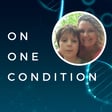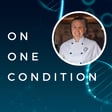Become a Creator today!Start creating today - Share your story with the world!
Start for free
00:00:00
00:00:01

Episode 30: Richie Kahn - Wolfram & Charles Bonnet Syndromes
Richie has a genetic condition called Wolfram Syndrome. The main symptom is a progressive optic atrophy that results in partial loss of sight in Richie's case. In conjunction with the loss of sight, he developed Charles Bonnet Syndrome, which causes his brain to see images that are not there, also known as hallucinations. Richie shares his journey with both syndromes and the loss of sight that has led him to purchase a white cane shortly before the interview. We talk about his involvement with the Glaucoma community and how important it is for him and others to share about their condition.
The song selected by Richie is The Distance by Cake.
Transcript
Introduction to 'On One Condition' podcast
00:00:01
Speaker
Hi, I'm Sylvain Viatoreau, and you're listening to On One Condition, a podcast to raise awareness about health conditions by listening to people who leave them every day.
Richie's musical inspiration and life journey
00:00:11
Speaker
My guest today is Richie Cahn, and we're going to talk about Wolfram Syndrome and Charles Bonnet Syndrome. Hi Richie, nice to be with you today. How are you? I am excited, so thank you for the opportunity. Nice to chat again.
00:00:30
Speaker
Yes, very nice indeed. I love starting with a song, so we'll go straight into it. Would you like to tell us which song you chose and why? Yeah, absolutely. It's funny, I'm not sure why this came to me immediately. There was no second choice, but the song I chose was The Distance by a 90s band Cake.
00:00:52
Speaker
And in particular, there was a part of the chorus that really kind of resonated with me. Now, this song, for those that are unfamiliar, not necessarily the most uplifting, right? It's kind of a song about failure, but in the chorus,
00:01:07
Speaker
Uh, they keep talking, you know, he's going the distance, he's going for speed. And it just kind of resonated with me because I am absolutely going
Discussion on life goals and finish lines
00:01:16
Speaker
the distance. So my speed is a lot slower than it once was due to some of the visual impairment from Charles Benet and Wolfram that we'll talk about. But, uh, for me, it's all about the finish line.
Understanding Wolfram Syndrome
00:01:27
Speaker
So that's why I chose the song. Plus it's a great lesson.
00:01:31
Speaker
Yes, and you reminded me of Cake, which I loved, so I will listen back to it. Thank you. That was a good album, Fashion Nugget. Yes, definitely. Interesting. It's all about the finish line, but will the finish line actually ever happen or does the finish line move?
00:01:58
Speaker
I think it definitely always moves if we're talking finish line in terms of goals and objectives, but in terms of the primordial finish line, that also moves, but it definitely happens. Yes. Yeah. That's for definite. Right, so let's start talking about, if I'm not wrong, Wolfram, which makes more sense to start with. Sure. Would you be able to tell us what it's about, how it affects you?
00:02:27
Speaker
Yeah, absolutely. So Wolfram syndrome is one of these ultra rare conditions. Best they can tell prevalence is maybe one in 700,000. It is an endoplasmic stress reticulum disorder. So what does that mean? The way Wolfram typically presents is in youth between six and eight years of age with progressive blindness. It's often relatively slow, relatively mild, but it starts quite young.
00:02:56
Speaker
Typically, the next symptom that occurs is insulin-dependent diabetes between 8 and 10 years of age. And by 30, two-thirds of patients are dead. There are brainstem atrophy and they are unable to breathe on their own. It's kind of like ALS, Lou Gehrig's disease.
00:03:14
Speaker
So for me, and I know this is not unusual for patients with rare, way back in 2019, I was working in ophthalmology. I was working in sales. I had pretty good health insurance. I also had an optometrist I liked a lot who was never, ever covered by any vision insurance plan I had.
00:03:34
Speaker
Liked her. We had a good relationship. I made an appointment to go in. And at the end of my session, I could just hear in the tone of voice, she had some concerns.
Richie's personal diagnosis experience
00:03:44
Speaker
She was concerned because she thought I very likely had glaucoma, which is a condition that tends to manifest when there's either improper drainage or too much pressure on the nerves connecting the eyes to the brain. And that pressure leads to symptom-free vision loss.
00:04:01
Speaker
After taking a look at my imaging again, putting me through the paces, my doctor referred me to a glaucoma specialist. We were off to the races. I worked enough in biology. I knew just enough about glaucoma and vision loss, I think, to be dangerous. I understood it's likely well-controlled with eye drops.
00:04:22
Speaker
But is someone working in ophthalmology and with a background in advocacy? I wanted to learn more. I wanted to do my part to raise awareness because, again, glaucoma is typically not something you're aware you are experiencing until you've lost, permanently lost vision.
00:04:38
Speaker
So I started volunteering with the Glaucoma Research Foundation. I just saw my friends at the foundation over the weekend. Just got back from San Francisco. They've got a fantastic event every year. And I was at one of their functions after the American Academy of Ophthalmology. And a doctor who volunteers with the Glaucoma Research Foundation very kindly said, I want you to come visit me. I want to take a look at your imaging. I want to look at you myself. And I couldn't say no to that.
00:05:07
Speaker
I came in through to Philadelphia where I'm from and my wife joined me.
00:05:16
Speaker
We really enjoy Philadelphia. My wife isn't from here, but she spent a number of years. We were excited to see friends. It's our favorite bars and restaurants. We kind of thought that the eye exam was a formality. And we learned very quickly that the doctor was concerned. I did not have glaucoma and I'd lost about 15 one, 5% of my vision.
Late-onset Wolfram Syndrome
00:05:35
Speaker
One thing led to another. Eventually I got to the neuro-optimologist. I couldn't figure out what was going on. He did some genetic testing.
00:05:45
Speaker
I guess it would have been this week in 2020 because it was the day before I went to scope down in Orlando. I know everyone's there right now. I had a call with the doctor and it was about 30 seconds long.
00:05:57
Speaker
I could tell he was uncomfortable with what he was telling me. He was unfamiliar. And he knew as well as I did that I went on to Google, which is exactly what he did. And I was reading the same information. He said, your test results are back. You have Wolfram Syndrome. Consulted genetic counselor. And he thought he was giving me a death sentence.
00:06:19
Speaker
Never spoke with the man again. I was able to get the genetic test results and I was able to get connected with a key opinion later from Toronto, Washington University of St. Louis.
00:06:30
Speaker
But in that moment, as I mentioned, I was getting ready to go to the conference. I was doing all the reading I could before I packed my bags. And you can't see them, but I am pretty well covered head to toe in Tibetan Buddhist imagery. I've went to Buddhist Sanghas for years. And when I told my wife the news, I was very calm. And the way I thought about it was, look, I could see well previously.
00:06:56
Speaker
Maybe not anymore. My brain stem was healthy. Maybe that changes. It was very much just comfortable with change and the uncertainty.
00:07:07
Speaker
To date, I am told I have one of the more mild cases of Wolfram just based on how it was presenting, but division loss is a lot more progressive. The age of division loss is abnormal. There's really no way of knowing for sure what will happen, but taking it day by day. I just got my first white cane the other day, which is more so for the Charles Bonais syndrome we'll talk about in a moment.
Impact of Charles Bonnet Syndrome
00:07:36
Speaker
So mild case, but also, I guess, slightly unusual if you said that usually it affects children between the age of six and eight. Yeah, absolutely. Do you know, do you have a reason for the fact that it started to present itself later in life for you? Not really, all I can really figure, they added my particular genetic
00:08:07
Speaker
panel with my form of genetic variation to this panel about three months before I was diagnosed. I think there have to be other patients that have this kind of presentation, but this was definitely not the first test they had for it. So I don't know when those other – I think it was the 17th patient at that point diagnosed when they presented, but I know I've been connected with two patients in the last few years.
00:08:31
Speaker
One is in his mid-60s. The other is in her early 70s. I think their only symptoms has been relatively mild visual impairment, which I think was just diagnosed through a routine eye exam. So it sounds promising in a way then. In that case, for them presenting late and mild? Yeah, I'm certainly hoping that's the case.
00:08:55
Speaker
Yeah. So you said that it's a progressive loss of vision. So how much has it progressed between 2020 and today in 2024? Yeah. So that's a really strange thing. My vision loss and what I experience isn't necessarily reflected well by the exams. So for example, when you go to the eye doctor and they put that patch on one eye and they give you the joystick and the
00:09:23
Speaker
opposite hand usually and it feels like you're playing a video game. That's a visual field exam where they try to see in your field of vision in each eye are there any spots of light that you can't make out. My visual field exam is pretty dark. I've lost about
00:09:39
Speaker
60% in the left eye, 40% in the right eye. They often will do OCT, imaging of the optic nerves. I've officially bottomed out of that test. My pressure is very normal, which is abnormal for patients with optic atrophy.
00:09:55
Speaker
But as I look around the room, as I look at you, I think I have a clear picture of what you're wearing, the photos behind you. Where it gets really interesting is something called Charles Bonnet syndrome. I've never heard of Charles Bonnet. So Charles Bonnet was a Swiss naturalist in the 1720s. He was interested in a lot of things. He was interested in botany. He was interested in medicine.
00:10:24
Speaker
As luck would have it, he wound up dealing with a substantial amount of vision loss throughout his life. But where the syndrome got its name was because he was interested in observing his grandfather, because his grandfather, he noted, had lost a lot of eyesight. And his grandfather was experiencing two kinds of symptoms. One would be repeating patterns, colors, shapes.
00:10:50
Speaker
The other was a little more sinister, disembodied heads, dragons, things that if grandfather was lucky he knew were not really there. So a lot of people with vision loss – and it varies. It could be up to 50% of patients. It doesn't matter how or why you've lost vision. But if you've lost a substantial amount of sight and you've had good eyesight from birth, your brain tries to fill in the gaps. Sometimes it's correct. Sometimes it's incorrect.
00:11:17
Speaker
Sometimes I can tell. One of my first indicators was my wife was suddenly wearing Groucho Marx glasses and nose putty. She looked like the silent film actor. Like she was wearing a disguise and I knew that wasn't true. But other times, for example, I'll be walking around. I've got one particular instance in mind. And I saw an 18-inch wide, ovular, horizontal marker. The outside was ringed in chestnut. The inside was kind of baby food.
00:11:47
Speaker
green brown and there was a name in a year chiseled in the center, we'll say con 1861. So I told my wife about it. She was with me. We were going to go for a walk later that afternoon.
00:11:58
Speaker
So she asked to see the marker and we spent a lot of time looking for it. That marker was not there. The marker was never there. My brain just told me it was appropriate and should be in that particular location either because that's what it processed or it referenced other things, other markers it had seen in other towns in Philadelphia or San Francisco.
00:12:20
Speaker
And it said this belongs here. So with the Charles Bonnet, I can't trust my eyesight, right? So I can't drive anymore because I can't accurately read an intersection. I recently got my first white cane about three, three and a half weeks ago because depth perception is a huge issue. I can't tell if steps are steps, maybe they're ramps.
00:12:41
Speaker
Things that are dry look frozen and slippery. And just thinking about conferences and scope again because it's this week. Conference hall carpet. I know it's hard for everybody with the swirls and patterns. Without a cane, I really struggle to process the carpeting.
00:12:59
Speaker
Okay. So Charles Bonet is somewhat linked to Wolfram because Wolfram is the loss of vision, but then Charles Bonet is the hallucinations that come from this written position of loss of vision. Is that right? Yeah, that's correct. So the Charles Bonet, you could have lost your eyesight from glaucoma, age-related macular degeneration. Maybe you had an injury, but the Charles Bonet is the manifestation of that loss of vision.
00:13:31
Speaker
And how often does that happen, having like vision that, and I understand that it's not necessarily hallucination, but sometimes it can be that your perception is not exactly what the reality is. Is that right?
00:13:47
Speaker
Yeah. Yeah. And I'm uncomfortable with the word hallucination. I know not everybody is. You know, that has changed over time. It varies for certain people. It's not constant for me, but yesterday, you know, just watching the Super Bowl or sort of watching the Super Bowl, I definitely experienced a number of hallucinations in my decently well lit hotel room. A lot of
00:14:11
Speaker
creatures for a lack of a better term, kind of moving in the shadows, which I knew for a fact weren't there, but you just can't turn them off. Yeah, it's not something that you can control. Is that right? So there are some techniques you can try focusing either on the hallucination, turning to the left, holding your gaze, turning to the right, holding your gaze. Doesn't necessarily work for everybody.
00:14:40
Speaker
I admittedly have not tried those techniques as rigorously as perhaps I should, but I'm also not really bothered by the hallucinations. If they were really impacting my ability to walk around, to navigate independently, then I think I definitely would pay more attention to some of those strategies. But right now, honestly, I see a lot of dogs that don't exist, which is good in that I'm a dog person. We've got two dogs.
00:15:07
Speaker
But, you know, it's not like they're jumping out in front of me while I'm going for a walk. But if I was experiencing something like that or something more troubling, I think I would definitely spend some more time looking into some of those techniques for managing. And does it look real? Like, does it look appropriately, like, for example, a dog, do they look appropriately placed and right size? In a way, believable.
00:15:36
Speaker
It depends. For the dogs, they often look correct.
00:15:42
Speaker
I'll be going for a walk with my wife. She'll be walking one of our dogs and I'll just start grinning and she'll go, what do they look like? How big are they? What color? Is the dog hairy? You know, and sometimes it could be a mailbox. It looks like a dog, but other times it's just an empty lot, right? Or there's sidewalk. There's no animal there. You know, in that case, we've got a lot of dogs in the neighborhood. I couldn't tell necessarily if a dog is actually there or not.
00:16:07
Speaker
Sometimes the hallucinations are apparently just that, right? They are obviously not real. But I can't always tell, right? So if I see someone going for a walk, I remember having this experience with my wife. We saw the same guy every single day for months and he wore the same thing. Evidently, I had no idea.
00:16:28
Speaker
Every day, we're in Durham, well, Durham, North Carolina, where Duke is located. And this gentleman, I think, is
Managing Wolfram Syndrome without treatment
00:16:36
Speaker
a Duke fan. He was wearing, I believe as my wife described it, a blue long sleeve Duke top with white writing, short hair. I think he was clean shaven. My wife asked me what the guy looked like. And I think I saw a brown pants, a white windbreaker, long hair, a beard.
00:16:56
Speaker
And I mean, I saw it day after day, even though I knew it was wrong, I just saw the same thing. So sometimes you just don't know.
00:17:04
Speaker
Yeah, I assume that it was your brain kind of replacing an empty space with something else, but it's not necessarily that. The way I try to describe it for myself at least with my form of vision loss, it's almost like those optic nerves connecting the eyes to the brain, almost like they're fraying.
00:17:29
Speaker
Sometimes things are very washed out, wiped out, not necessarily blurry. I don't have actual blind spots or black spots in my vision. But I don't know if sometimes it's simply the brain is trying to process. It doesn't have a full image to read and things just look kind of wiped out. So for example, in the fall, if the foliage is turning colors,
00:17:51
Speaker
and the sidewalk is wet and there are trees and playground equipment, it might all wash together because it's vaguely brown, gray, green, you know? I don't know if that's Charles Benet or if that's those optic nerves fraying.
00:18:08
Speaker
So going back to what you started with, so with Wolfram, you mentioned impact to the brainstem risk of diabetes. Is that something that you are at risk of? Do you have regular tests to check those aspects?
00:18:28
Speaker
Yeah, absolutely. So the way it works for Wolfram, because this is an orphan condition with no treatment, you are managed proactively, right? So if you are able and fortunate enough to have a full care team, you would see an ophthalmologist, I had been going quarterly, there was no value in it. Eventually, I pushed that back to yearly, you would have blood work done every year, not necessarily by an endocrinologist, but it could be just a good
00:18:59
Speaker
internal medicine doctor or general practitioner just to see if you are diabetic or pre-diabetic.
Richie's advocacy and volunteer work
00:19:06
Speaker
You would often see a neurologist at a regular interval. It might be every two years for imaging of the brain. And with a neurologist, it's interesting, right? Because
00:19:18
Speaker
In some ways, it's like some of my dear friends who have a family history of Huntington's disease. You wonder, does it make sense to get tested if I am tested and I find out I have Huntington's disease?
00:19:32
Speaker
There's not much I can do about it, right? So I could have the brain imaging done if I feel fine, and I could learn that the brain stem is atrophing, but there's not really much that you can do there. For the neurology aspect, I laughed because after diagnosis, I reached out to a neurologist. I worked with for years. I respected. I trusted. I told him what was going on. And I said, look, I need an honest answer. Are you comfortable with this? He said, yep, absolutely. I'm happy to manage this. I look forward to it.
00:20:01
Speaker
What can I tell you? Evidently the doctor retired shortly thereafter and I never got a note in the mail, so I do need to find a new neurologist. But what I think I will be doing in general, I mentioned my key opinion later is at Washington University of St. Louis. He has a special center out there where if patients come out for two days, he can line up all of those appointments, all of those specialists. So you don't have to worry about getting all the troops together and he can really be the one driving care remotely.
00:20:30
Speaker
No, that's good. That's very good. You also mentioned that you just come back from the glaucoma society, if I'm not wrong. Do you still see a benefit in being part of the glaucoma community?
00:20:49
Speaker
Yeah, absolutely. So I mentioned earlier, I got plugged in with the Glaucoma Research Foundation. I was looking for resources and they have a tremendous, tremendous website. Understanding and Living with Glaucoma is a wonderful resource. And I started reaching out to everyone at the organization and I just kind of said, look, how can I help, right? So I have been volunteering since that time. I am the
00:21:15
Speaker
patient summit steering committee chair. We have another patient summit coming up in Philadelphia in June of 2024.
00:21:25
Speaker
So I spend a lot of time talking with not only doctors and patients in that community, but with eye doctors and patients who may be experiencing vision loss from any number of causes. And I do that for a couple reasons. Number one, I am aware that for most conditions that lead to blindness and inherited retinal diseases are different because they often start younger.
00:21:52
Speaker
I am not necessarily the typical patient. You know, most patients are usually older by quite a bit. I know younger patients often feel isolated. They feel alone. They feel like no one really understands them. I spend a lot of time educating those doctors about Charles Bonnet in particular, reminding them that this is a condition that impacts a substantial proportion of their patients.
00:22:19
Speaker
It is something that doctors have learned about in med school. They have not thought about it again in years. And if you don't create the space for a patient to throw to the topic of some of the things they are seeing,
00:22:33
Speaker
The patient will never hear about Charles Benet syndrome and the end result is they feel like they are experiencing premature dementia, a mental health crisis. I don't know how many conversations I've had with patients, Wolfram and otherwise, where I tell them my story about Charles Benet and even though I haven't had a single person acknowledge they have
00:22:55
Speaker
these types of visual hallucinations going on, I frequently hear an audible sigh of relief.
Mental health and support networks
00:23:01
Speaker
I can hear the shoulders drop, right? I can hear people kind of go, okay, it's not just me. He gets it and this is normal, you know?
00:23:14
Speaker
I do that as well, but with the Glaucoma Research Foundation, it's also just a lovely, kind, collaborative, patient-friendly group of researchers working on vision restoration, right? So how could I pass it up?
00:23:30
Speaker
Yeah, I get that. And that's very good of you to carry on going. Interesting to hear that you actually share about Charles Bonnet with doctors and inform them of it, which I'm sure has a very positive impact to their patients afterwards. You mentioned mental health, which obviously
00:24:02
Speaker
I can see why there could be a relation between Charles Bonnet and patients feeling like they have some sort of mental health issue. Is that something that you have felt has it had any impact on your mental health? Yeah, not even for Charles Bonnet specifically, but for vision loss more broadly,
00:24:30
Speaker
There are all of these surveys. I don't know quite honestly who is sponsoring this market research. But when they ask people, what are you most afraid of? What are you most concerned with? Researchers always expect people are going to say, well, I'm concerned about dying. We'll take care of my family, whatever the rationale is. But it's usually dying is what they expect to hear. And the response, and sometimes it's a response to a question. They say, what really scares you most in life? It's not dying. It's going blind, right?
00:24:59
Speaker
At least when I was growing up, right, there were kids in my school who were visually impaired, who had a number of other disabilities, but you were generally kept in separate classrooms. I volunteered with the Special Olympics, so I spent time with some of those kids. But vision loss and how you navigate that world isn't something that I think, unless you have a pretty strong history of vision loss in your family,
00:25:27
Speaker
people think about until it happens to them and then they feel like they have no one to talk to, no one's going to understand what they're experiencing, even though vision loss is quite common, right? So I was talking to a patient at the Glaucoma360 New Horizons forum the other day.
00:25:47
Speaker
And they were asking questions about some non-medical treatments for glaucoma, right? So many of these treatments work by making a positive impact on your mental health and well-being, right? So depending on who you are,
00:26:04
Speaker
There's a good chance you should be lifting really heavy things. You shouldn't be doing yoga poses like downward dog that can lead to increased pressure. But for me, and I know a number of other patients, running is tremendous. It helps you de-stress. It helps you process what you're experiencing. So that's been huge for mental health. Talking to people. I was really lucky. There were strange confluence of events.
00:26:31
Speaker
I found myself connected to one, two, three award-winning Paralympic visually impaired athletes early on in my vision loss journey.
Running despite vision loss
00:26:42
Speaker
And these are all world-class athletes, eyesight or not, right? But I'll talk to my good friend, Tucker Dupree, who lost about 70 or 80% of his vision when he was a teenager. And Tucker swam with Team USA for 12 years.
00:27:00
Speaker
You know, he's been all over the world swimming, and I'm certainly not going to set any records, but when I think about what Tucker or Lex Gillette or Amy Dixon have been able to accomplish, irrespective of vision loss, irrespective of mental health burdens placed on them, it's a good reminder that I can sort of go the distance here, right? Whether it's with my advocacy at Canary Advisors, navigating
00:27:28
Speaker
the zoo and a parade in Phoenix with a cane for the first time, whatever it is. It's just a good reminder. Some days you feel lousy, you feel down, you feel dejected. I was actually about a block away from where I am now on Tuesday. My dad had a doctor's appointment in Philadelphia. I came in to meet him and I had an hour of free time. End of the day, I had been on a plane. I really wanted to go for a run.
00:27:55
Speaker
And even though the light was less than ideal, it snuck the run in. I felt good. I felt cocky. And you know what happened as soon as I got to the hotel? I ran chest first into a glass door. So it took me down the peg, you know, but it was a good reminder that even if you had a good run, you felt comfortable, you didn't trip on anything, always have to be aware.
00:28:24
Speaker
Yeah. I'm impressed that you can still run. That's amazing. You know, running is different. Many years ago, I had a horrific knee injury. I was unable to run. I couldn't even walk, really, for about three years. And when I came back, I made a very, very conscious decision. I said, look, I want to do this for the long haul. I'm not the fastest runner. I'm not going to set any records. But I want to be able to run
00:28:51
Speaker
when I'm older, right? So I make it a point, I made it a point to run the minimum amount of mileage to achieve my goal, which is to stay in half marathon shape. I only run three days a week. I say only not that three days is not three days more than most people do. But I have so many friends who run five, six, seven days a week. And the more days you run back to back, the greater likelihood of injury goes to almost 100%. But now when I run, if I'm running by myself,
00:29:21
Speaker
It's usually the same routes in my neighborhood over and over again. I have not tried, but I think I'm going to give it a go. I've not tried running with a white cane yet. It just seems like it would...
00:29:33
Speaker
wind up in me being very bruised and broken from getting a cane to the ribs. But I wear a reflective vest. It says blind on both sides. Hopefully it should get people to give me a little more space.
Using a white cane and public perception
00:29:45
Speaker
And when I'm running with friends, they give me visual cues, right? They'll say curb on the left at 10 o'clock, for example. They'll remind me about the red light. You know, they'll remind me, hey, I know you can't see that intersection clearly. So don't go through it, right? Occasionally,
00:30:03
Speaker
Very rarely, I will wear one of those tethers. You'd go to the mall food court in the 90s and there'd be a child running around wearing a soft plush gorilla themed backpack on a tether connected to their dad's wrist. There is no backpack, but there is a soft flexible tether. My wife bought me a number of years ago. I think if my vision loss continues to progress, I might try the tether more. But for now, I'm pretty comfortable with the verbal cues as I run.
00:30:30
Speaker
It's so nice that you have the support with your friends as well. Moving to the white cane. So the world is not made for people with vision impairment or loss, unfortunately. How does the white cane help the white cane world? Great question. So a few thoughts on that. Number one,
00:31:01
Speaker
Most people, unless they have no say in the matter, will put off using a white cane. Most people who would benefit from a white cane will not do it because there are mental barriers, right? People get really concerned about how they're being viewed. Am I blind enough? Is this legit? Am I an impostor? Are people going to say things to me? Are they going to ask me questions? Are they going to be nasty?
00:31:31
Speaker
I had thought about the cane for a while. I didn't really have that barrier. I just wasn't really sure what type of cane, what technique I wanted to use. So I started doing some research and I was pretty confident I was going to do it, right? I had decided I was going to get a white cane with the
00:31:49
Speaker
Red bottom segment, which is kind of the standard that theoretically tells people as though they would know that you've got some vision. Most people that are blind, 90% of people who are blind have some vision. I knew I was going to get what they call a marshmallow tip. It's roughly the size of the marshmallow. It's solid. The idea is it's wider than most cracks in the sidewalks. It won't get caught as often.
00:32:12
Speaker
I did my research about how tall the cane should be, you know, between armpit and shoulder. I even figured out and my wife was laughing. I said, look, I know I want to use a constant contact technique. So cane in the right hand, thumb down like you're holding a golf club.
00:32:30
Speaker
My right foot goes forward, the cane goes to the left. Left foot goes forward, cane goes to the right. And you sweep back and forth to keep the cane on the ground. My wife was laughing because before I even ordered the cane, I was walking around the neighborhood practicing, right? Because it does change your gait. And I guess it was 10, 11 days ago, we were visiting, we were on a regular airport to visit our nieces in Phoenix. One of them was turning three that weekend.
00:33:00
Speaker
She had a birthday party, two birthday parties, one with a lot of kids, a lot of things I could potentially bump into at the house. Then she had a folklorico Mexican folk dance performance, her very first one, at an enormous parade. Then she had another birthday party at the zoo. So I knew between all of the birthday party activities, all of the airport excitement, some other travels I had going on,
00:33:28
Speaker
It would probably behoove me to try the cane out. And what can I tell you? I had practiced for about a week beforehand. Got in the truck. My wife was driving to the airport. We got five minutes from the house and she looked at me and she went, so did you want your cane? Because you left it at home.
00:33:47
Speaker
I wasn't used to it, right? My wife very kindly went home. She pulled over so I could run inside and grab that cane. And I committed to it, right? I made sure that if there was benefit for me for navigating, if there was benefit in giving people a bit of a visual cue, right? Sometimes maybe it's just walking around holding that cane in your hand.
00:34:11
Speaker
Other times, it's sweeping, right? But I was using McCain in Phoenix and my wife's family – in-laws' family, for lack of a better explanation. They were kind of looking at me and they were like, oh, I don't know if this is going to work. I'm not really sure. And they were dawdling.
00:34:29
Speaker
I had the parade. It was very crowded. We had to get somewhere. And I said, get behind me, friends. Let me show you the way. I'll part the sea. And I just started going. And they could not believe it. They followed me around like little ducklings. So sometimes it works well. The airport in Atlanta yesterday, it did not work well. Everyone's plane was late. They were upset. The train wasn't running. So I just folded the cane up. I walked the best I could. And I used it when it wasn't going to
00:34:59
Speaker
potentially in danger. You know what I mean? Yeah, I do. I see what you mean. Well, it sounds like you're already giving it a good go and finding it useful. So that's, you know what, I'm really trying and I have been
00:35:18
Speaker
pleasantly surprised by the conversations it has opened up. I've had a few friends who have kind of said, hey, so how's the, how's the cane going? Because, you know, I was sort of thinking maybe I would get one, you know, so we've had those conversations. But I was in a hotel the other day, I was walking back to my room and someone was cleaning one of the hotel rooms down the hall, you know, we kind of exchanged pleasantries and they kept walking. And I heard, excuse me, sir.
00:35:48
Speaker
I've got a question. Do you mind if I ask you a question about your cane?" I had no idea where this thing is going. The gentleman proceeded to tell me that he had seen
00:36:00
Speaker
Like in the last week or two, four or five folks with canes, and he's noticed that there are different colors on some of them, he wanted to know what they meant. And fortunately, I only had to tell him about the red, because truthfully, that's the only one I really know about, right? Because it's the standard. But I was explaining it signifies in various levels of vision loss, usually. And you could just tell he was really excited to learn more. This wasn't something he had any exposure to. He just sounded like
00:36:26
Speaker
oh great I learned it an interesting fact now so when I see somebody either in the hotel or downtown Philadelphia walking around with that cane I know what it's for know why they're using it and hopefully you can keep that in mind and you know maybe give people a little more space to work with that cane.
00:36:43
Speaker
Nice, nice. I'd like to change subjects slightly moving to what you do for a living because you've been in patient engagement or patient advocacy for quite some time.
Patient advocacy and research integration
00:37:03
Speaker
Would you like to share a bit more about what you do now?
00:37:06
Speaker
Yeah. So I'll provide a little bit of background. I am a public health and advocacy guy by training. I started out in the nonprofit world before falling into clinical research like so many people do. I am a few weeks shy, come to think of it, of my 14th anniversary in clinical research. I have worked in patient recruitment. I have worked for a number of CROs.
00:37:29
Speaker
I've worked in health technology. Back in 2019, I was an award-winning business development guy. I was working in Opthalmic Focus CRO doing drug and device research for the eye when I found out that I was going blind. And I realized very quickly, number one, I didn't want to travel 70% or 80% of the time. I wanted to spend more time with my family. I wanted to selfishly map out the house the best I could assuming the vision loss was going to progress.
00:37:59
Speaker
I realized very quickly that I was dealing with some processing issues from Charles Bonnet, so it didn't seem feasible to be on the road that often, and it just didn't really seem appealing. I realized I am very fortunate. I am a crusty old white guy in clinical research. I know how the development sausage is made.
00:38:21
Speaker
I recognized we knew a terrible job incorporating the patient perspective and I got kind of excited. You know, again, I realized the fact I was even able to think about making a pivot, most people don't have that opportunity. Visual impairment or not, you know, if we think about the visually impaired, the vast majority, I think 70% of us are unable to hold down meaningful full-time employment from the visual impairment, right?
00:38:46
Speaker
But I thought to myself, look, the same thing that attracted me to public health, the same thing that got me into research, which was the opportunity to impact multiple patient lives at once. Maybe there is a way to continue doing that by really focusing on that inherent mismatch between what patients want to need and clinical development plans. So I started out in 2019 exploring FDA's patient-focused drug development framework
00:39:13
Speaker
And as much as I enjoy those externally-led patient-focused drug development meetings and listening sessions, I was really more into the prospect of working with pharma, working with advocacy organizations, working with patients, caregivers, and care partners. So everybody understands what matters most.
00:39:34
Speaker
the unmet needs, right? And if a clinical development program is moving forward that patients are excited about, the data looks good, everything looks safe and effective, I want patients to have the opportunity to share that excitement, to talk about those unmet needs, and to really articulate why access and reimbursement are not acceptable sources of delay, right? So it's engaging with all of these individuals
00:40:01
Speaker
across the life cycle from indication selection through launch. So back in 2019, after I got the incorrect diagnosis of glaucoma, and I made that decision to travel last to get back to my roots in advocacy, I had the good fortune of getting connected with my dear friend and now business partner, Canary Advisors, Jen McNary. And Jen is someone I would describe as a typical rare disease advocacy mom.
00:40:29
Speaker
In that, Jen has more energy and more patience than almost anyone I know, but she had no background in healthcare, no background in research or advocacy. She just found out that her two oldest sons, Austin, who just turned 25, I believe, and Max, who just turned 22, found out they had Duchenne muscular dystrophy. And Jen rolled up her sleeves and she brought multiple products to market.
00:40:54
Speaker
And as we work together in the decentralized clinical trial space, as we work together as subcontractors doing consulting work, first for an externally led patient-focused drug development meeting and then getting involved in patient advisory boards, I realized very quickly, number one, Jenna's an amazing skill set. It is very much complementary to my own, big focus on regulatory access and reimbursement.
00:41:21
Speaker
I really started to think, and eventually I guess I convinced Genevus, that we had a really interesting opportunity to bring the clinical research and the advocacy skillsets together, working with kind, scientifically interesting patient-focused organizations to increase everybody's likelihood of success and better addressing those unmet needs.
00:41:48
Speaker
So after working together informally for a couple years, we realized we were going to do our own thing. Canary Advisors was born back in November of 2022. I went out on my own. Jen joined me full time a couple months later. And it's been an absolute delight. We don't just work in ophthalmology or rare disease, kind of work across the board. And it's just been so much fun, you know, working in really interesting projects and connecting with sincerely lovely people.
00:42:16
Speaker
Amazing. Have you seen an evolution in patient-led research or patient engagement? I mean, we hear so much more about it, but is it real or is it just another buzzword in the industry?
00:42:35
Speaker
Yeah, great question. So there's definitely been progress. We are definitely getting there. For years, everybody would talk about patient centricity. And even people at AstraZeneca where the term was coined back in 2016, we talked about it not knowing the genesis of the term, not knowing
00:42:56
Speaker
the intent behind it, not knowing the actual meaning, right? And they talk about, we really have to give patients a seat at the table. Well, that table was made by patients. It belongs to patients, right? We don't want to cursorily get some input. We want patients, caregivers, care partners to be involved for the lifespan of clinical development, right? So often, I'll talk with people who
00:43:21
Speaker
They may be working regulatory or medical. They're not working with patients every day. They'll say, well, we're interested in getting involved in advocacy, but my boss wants to know, what is the return on investment? I am that qualitative public health guy, but I get it. They want to talk about quantitative benefits. One of the things I often share
00:43:46
Speaker
There are a couple of statistics that I think all of us in research know, $2.4 billion, 10 to 12 years to bring a new drug to market. And the vast majority of studies in humans, I think it's 85%, 86% fail to meet timelines, patient recruitment is the largest source of delay.
00:44:04
Speaker
For my mind, that delay, many of those delays are because of that fundamental mismatch between those patient wants and needs and clinical development plans. There is little conversation historically to get a sense of, is this protocol appealing? Is there something overwhelmingly burdensome?
00:44:25
Speaker
When you talk about the potential benefit, Ken Getz had some fantastic slides that he presented at the virtual 2021 patients and partners meeting. I remember I got so excited, even though Ken sent the slides out later on, I was taking screenshots. And Ken and team were looking, I believe it was a retrospective analysis of phase three programs that utilized the patient advisory board versus the programs that did not.
00:44:51
Speaker
And the number of extraneous endpoints could be removed with substantial. The number of protocol amendments that could be avoided
00:45:01
Speaker
It was like 33% fewer amendments. And then he got to a slide where he talked about the average cost of avoiding one amendment for a phase 3 protocol, not even looking at downstream implications. But when you get people excited by talking about the benefits of advocacy, making sure patients are engaged, that they've been heard, that they are able to collaborate and co-develop with you, and then you're able to say, look, here is the benefit.
00:45:27
Speaker
Then I found people are all aboard, right? But like most things in advocacy, it's all about education, awareness, not only of industry, right? But talking to patients about clinical research. What is it? What is clinical research as a care option?
00:45:45
Speaker
And then talking to clinicians in the community because so few of them are involved in research. They never learned about it when they were in school. They don't have time to learn about it now. So making those connections, building awareness, and making sure that a wider proportion of individuals that are interested are engaged.
Building relationships in patient advocacy
00:46:03
Speaker
Yeah, that's very interesting because I always pictured this very positive movement of patient engagement as a one-way street, like the pharma industry needing to learn more from patients, but actually your point is a very good one about patients need to learn more about the industry as well.
00:46:27
Speaker
Yeah, you know what? I'll add one thing there. It's different messaging. It's a different starting point when you are chatting with patient advocacy organizations. They all have a different background, a different
00:46:43
Speaker
expertise in house. A lot of advocacy organizations are run by one individual unpaid, on the side, evenings, weekends, labor of love, but there are other groups like the Cystic Fibrosis Foundation that are well-resourced, well-funded, highly experienced. So their knowledge of industry and their experience working with industry also varies wildly, right? So making sure everybody knows that
00:47:11
Speaker
Working with industry in a meaningful, collaborative, strategic way is not a bad thing. Advocacy organizations, for the most part, think of themselves as trusted sources of information. They never want to be seen as pushing a particular trial or program. Making it clear that there are opportunities to provide
00:47:32
Speaker
chances for those in your community to share their perspective, to connect with industry, to learn, right? I think it's really important and also making it clear if you're an advocacy organization that says, look, just the prospect even of receiving money for unrestricted grant funding, you know, to do the good work we need to do for industry.
00:47:54
Speaker
I'm uncomfortable with that. Letting them know and letting industry know there are other opportunities. So my good friend Lily Stairs put out a fantastic eBook on this. It was, I think, called the HealthTech Playbook for Partnerships with Industry. And I often share this, right, because there are opportunities to
00:48:13
Speaker
provide resources, right, that an advocacy org might not have. So, for example, you're partnered with an advocacy organization. Maybe there's no exchange of money. But, you know, they are really understaffed and they really need help with graphic design. They need assistance with marketing. Maybe there is someone on your team who has a couple hours they can donate.
00:48:34
Speaker
Maybe there's someone you know in your network who would love to get involved, right? But making those connections, sharing those resources when you're able to, and making sure that you are really taking the time to listen, to learn, to understand preferred ways of operating, right? And the kinds of things advocacy organizations are comfortable with and the kinds of things they're uncomfortable with. And responding in kind winds up leading to a really
00:49:01
Speaker
optimal kind of relationship.
Richie's personal passions and happiness
00:49:04
Speaker
But of course, keeping in mind that every advocacy organization is going to be different, so you need to be flexible if you're coming from industry, building those relationships is key. Yeah, makes sense. I love your passion. It's amazing how passionate you are talking about this. You know what's so funny? First of all, thank you for saying that. I was having a conversation the other day
00:49:24
Speaker
I think I had been traveling since 3.30 in the morning. I was absolutely exhausted and I was telling someone in the glaucoma world – I think they were a doc what I do and I could just feel them smiling ear to ear and they said, your enthusiasm is palpable. I didn't want to sound corny. Every day is not great, right? Because we're human. Some days are harder than others. But the vast majority of the time, I wake up excited
00:49:53
Speaker
I've certainly been in roles in the past where that wasn't the case the majority of the time. And I know part of that is being close to working with patients again. When I don't have that in my life, I feel like I'm missing something. But really being able to engage particularly early on to roll up my sleeves, to think creatively.
00:50:13
Speaker
That's awesome. There's no way of getting bored when no two days are the same. It keeps me on my toes and there's always plenty of opportunity to learn, which I love about research. I couldn't agree more. Yeah, I couldn't agree more. Well, Richie, amazing, amazing talking to you. I feel like pumped up. Thank you. A pleasure. This brings me to my last question for the day. What's your happy place, a place where you feel at peace?
00:50:45
Speaker
Either hanging out with my dogs and my wife, dogs make me calm for whatever reason, even though I'm usually getting them excited. Yeah, that's definitely a happy place. Or in the Great Smoky Mountains in western North Carolina, we spend about 25, 30% of our time out there with the dogs, I might add. But even when I'm working and it's pouring rain and I'm just looking out the window, everything is lush and green, the other side of the yard,
00:51:14
Speaker
is our neighbor's pastor. They have a couple miniature horses, full-size horse, a bunch of farm dogs. It's just enjoyable, right? And you can take a break. You can just smell the fresh mountain air. And you can just hang out, you know, maybe you want to go outside during your lunch break and try looking for that fence marker that doesn't actually exist. It's about three quarters of a mile from the house. So, Silva, North Carolina is my happy place when I'm not with dogs.
00:51:45
Speaker
Well, I'll put that on my list of places to visit then. Thank you. Let me know when you're coming. It's 45 minutes south and west of Asheville. So if you like good beer, hiking, and food, it's all nearby. You've just described everything I love, so yes. I'll see you in Western Carolina. Yeah. Well, thank you so much, Richie. I really appreciate you taking the time. It's been extremely interesting all the way through, so thanks a lot.
00:52:13
Speaker
for the opportunity and thanks for putting out a fantastic podcast. It's a great lesson. Thank you.
